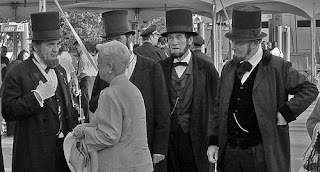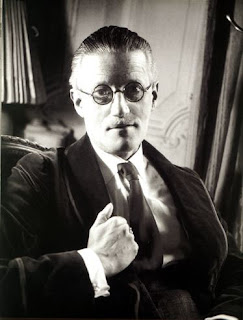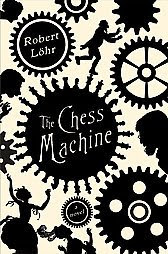Guillaume Apollinaire's "Le Pont Mirabeau":
Friday, February 27, 2009
Why Do CEOs Still Love Ayn Rand?

In Conde Naste Portfolio, a story about how even a major free-market economic crisis hasn't shaken business execs' faith in their favorite free-market philosopher.
From the story...
How did a Russian-born novelist become such an influential “thought leader” for American CEOs, entrepreneurs, and MBAs — and even Alan Greenspan? Consider the message behind Ayn Rand best sellers The Fountainhead and Atlas Shrugged, which speaks to anyone with ambition and a big ego: The gifted should do what’s in their self-interest. If you have a sharp mind, it is your moral responsibility to make yourself happy. The weak are not your problem. “I am for an absolute laissez-faire, free, unregulated economy,” Rand told CBS interviewer Mike Wallace in 1959. “If you separate the government from economics, if you do not regulate production and trade, you will have peaceful cooperation, harmony, and justice among men.”
Rand’s critics claim that the current financial crisis proves her theories unrealistic and selfish. “Her economic ideas were never really relevant or workable,” says Rick Wilson, a sociology instructor at Marshall University in Huntington, W.Va., which offers a class on Rand’s writings. “The time we’re living through is just another example of that.” And yet 51 years after Atlas Shrugged was published, Rand’s writing still wields considerable influence in business.
I was in a theatrical production of Rand's "Anthem" in college that was filmed as a student movie. Sadly, this was pre-YouTube so you don't get to see me in robes with my buddy Ken Michie trying to act all philosophical when, in fact, we were both tools.
The Death of Newspapers
They're folding across the country. NBC Evening News takes a look at the latest casualty in Colorado:
Seattle is not immune. Our oldest newspaper will probably cease publication in mid-March.
Visit msnbc.com for Breaking News, World News, and News about the Economy
Seattle is not immune. Our oldest newspaper will probably cease publication in mid-March.
Thursday, February 26, 2009
Keruoac's Lost Novel

Rumpus lets us know about The Sea Is My Brother, a "lost" novel of Kerouac's that'll be published soon. It is based on his time as a Merchant Marine.
Wednesday, February 25, 2009
Top Twenty Horror Writers of All-Time

Mania offers up their list of the greatest horror writers of all-time. Just a hint, Stephen King isn't #1.
Tuesday, February 24, 2009
Walker Evans and the Picture Postcard

I've been fascinated with old photography of late. Walker Evans' work has struck a chord with me and so it was fortuitous to find on the Financial Times the Walker Evans Picture Postcard Archive. There's actually a showing of Evans' postcards currently at the Metropolitan Museum of Art and was reviewed recently in The New York Times.
Pictured above: “View of Easton, Pennsylvania,” 1935
The Book That Saved a Life and Sparked a Friendship

There is a great story on the Reading Copy Book blog.
From the story...
Shot in battle, Maurice Hamonneau, a soldier in the French Foreign Legion during WWI, lay wounded and unconscious for hours after an artillery attack near Verdun. Upon gaining full consciousness, Hamonneau realized that a bullet had been deflected by a 1913 French edition of Rudyard Kipling’s Kim (pictured above) he was carrying in his breast pocket. A mere twenty pages saved Hamonneau’s life.
When Hamonneau heard that Kipling was mourning the loss of his son John, he sent Kipling the life-saving book along with the Croix de Guerre medal he had been awarded. Kipling was greatly moved by this gesture and agreed to accept the book and medal only on the condition that he would return both items if Hamonneau ever had a son of his own.
Hamonneau did have a son and actually named him Jean in honour of the son Kipling lost.
Monday, February 23, 2009
When Panhandlers Need a Wordsmith's Touch

The New York Times follows author Gay Talese as he assists panhandlers with their sign making.
From the essay...
As I strolled past Bernard L. Madoff’s apartment house in the East 60s the other day on my way to cash a check at my neighborhood bank on Madison Avenue and 63rd Street, I was greeted by a middle-aged panhandler who sat on the sidewalk leaning against the bank’s brick wall waving a plastic cup in my direction.
After handing him a few dollars, I asked, “How’s the economy affecting you?’’
“No different,’’ he said. “It’s always lousy.’’
I entered the bank to complete the transaction, and when I came out he was gone. But as I headed downtown past Barney’s I met another panhandler who held up a sign that read: “Homeless. Please Help.’’
I dropped a dollar into his container, but at the same time thought that the sign might benefit from updating — it needed a touch of stimulus, that word that dominates the headlines. “I assume you’ve been reading and hearing about the financial crisis, yes?’’ He nodded. He was younger than the other fellow, and appeared to give me his full attention. “Maybe if you’d change the words on your sign you’d get more attention in the street, and people will donate more money…’’
Literary Death Spiral

NPR has a commentary by Dick Meyer about the waning book sections in today's newspapers.
From the story...
One of the sad, little sidebars to the sad, big saga of the waning of American newspapers is the disappearance of professional, edited book sections.
One of the last two major, stand-alone print book sections died this past Sunday, when The Washington Post published its last edition of Book World. The paper will still review books, but only The New York Times and the San Francisco Chronicle will continue to run a full mini-magazine devoted to books. It is a heavy symbolic blow to readers, writers and publishers. And it is an injury to our collective literacy and, thus, to our wisdom and intellectual agility.
If that sounds snobbish, well, so be it.
Sunday, February 22, 2009
Quote of the Week
Friday, February 20, 2009
Thursday, February 19, 2009
The Art of the Commencement Speech

I'll be taking a few days off. In the meantime, get inspired by reading some great commencement speeches through the years, from folks like Barack Obama, Bono, Vaclav Havel, Dr. Seuss, and John Kennedy.
My favorite commencement speech was the Kurt Vonnegut fake real one at MIT.
Great Book. Bad Movie

Why does Hollywood take our favorite books and turn them into crap? So asks Slate.
From the piece...
This isn't an original complaint: Liking the book better than the movie is a middlebrow rite of passage. And novels are a constant, renewable source of stories for Hollywood, with ready-built brand appeal—from the kiddie franchises (Harry Potter, Lord of the Rings, Narnia) to the airport bangers (Da Vinci Code, the Bourne etceteras). Nor are these always bad movies. It turns out that good plots and an epic dimension translate well from page to screen. But the attempt to scale this model by making midsize movies from literary novels has been an ugly disaster. In our post-The Reader world, I can safely say that I'd rather personally digitize back issues of Talk magazine than see another movie based on Harvey Weinstein's favorite book.
Poetry Aloud

You don't have time to go to your local independent bookstore for a poetry reading or an open mic? Fear not, you can listen to all sorts of classic poetry, read aloud to great affect, here.
Wednesday, February 18, 2009
The American Experience - Walt Whitman

Get ready to give a mighty yawp! You can watch a documentary on the great poet, Walt Whitman, seen on PBS, right here. Yawp, I say!
Here is an excerpt of one of his most beloved poems, "Song of the Open Road":
Allons! the road is before us!
It is safe--I have tried it--my own feet have tried it well--be not detain'd!
Let the paper remain on the desk unwritten, and the book on the
shelf unopen'd!
Let the tools remain in the workshop! let the money remain unearn'd!
Let the school stand! mind not the cry of the teacher!
Let the preacher preach in his pulpit! let the lawyer plead in the
court, and the judge expound the law.
Camerado, I give you my hand!
I give you my love more precious than money,
I give you myself before preaching or law;
Will you give me yourself? will you come travel with me?
Shall we stick by each other as long as we live?
Enjoy the documentary and your day, dear camerados!
Ten of the Most Controversial Books Ever

Dir Journal Info Blog lists books that have raised hackles, lots and lots of hackles, like The Catcher in the Rye, Lolita, and Brave New World.
Don't Get Depressed: A Writer's Guide to Surviving the Recession

The always wonderful Guardian guides writers through the tumult of our economic crisis with seven principles.
A couple of them...
2.Know Thy Genre
In a crisis, there's a temptation to reinvent the wheel. Don't panic. Know what it is you are writing – essay, poem, novel, history, memoir, thriller etc – and do that as well as you can. There are some wonderful novels in verse (Vikram Seth's The Golden Gate comes to mind) and some fabulously fictional histories (Carlyle's French Revolution), but these are the exceptions.
3.Tell a story
However you achieve this, don't forget that the book- and newspaper-reading public likes a narrative. You'll never go broke if you hold them by the throat and keep them asking "What happened next?"
Tuesday, February 17, 2009
Instapaper

Instapaper is " a fast, easy, free tool to save web pages for reading later."
Pretty simple concept:
1. You find something you want to read, but you don't have time now. You click Read Later.
2. When you have time to read, you come here on your computer or phone and get whatever you wanted to read.
13 Benefits of Installing Good Reading to Kids

Care of Itza Bitza.
A random sampling of said benefits...
Reading teaches morals. While other mediums such as songs and videos certainly can teach morals, many children’s book go above and beyond to meet this ideal in imaginative and impressive ways. For example, there are few morality tales as stark as the fairytales of youth, which teach against greed, laziness, talking to strangers and more. The beauty of these tales is that they are as lively and imaginative as they are moral, so they provide perfect pneumatic devices for playful young minds.
Reading helps children become engaged learners, rather than passive learners. Books force kids to use their imagination to paint the picture, rather than having it passively communicated to them through the picture on a television screen. This helps kids get the wheels turning in their minds, imagining scrappy heroines, honey-loving bears and mustache-twirling villains. Once you see those little foreheads scrunch, or watch your children stare dreamily into the distance while twirling their soup at dinner, you’ll know they’ve been bitten by the reading bug.
25 Random Things About Reading

Care of Itza Bitza.
A brief sampling of the random things...
It takes an average of 475 hours to write a novel.
The ratio of customers to bookstores is highest in Nevada, Texas, and Mississippi.
On the average, a bookstore browser will spend eight seconds looking at the front cover and 15 seconds scanning the back cover.
Pictured above: "Woman Reading," by Manet
Sunday, February 15, 2009
Quote of the Week
Friday, February 13, 2009
For You Romantics Out there on Valentine's Day

I'll be taking a long weekend, in the meantime, woo the one you love with the Poetry Foundation's collection of Valentine's poems.
The Medieval World, Digitized

UCLA has done something pretty damn cool. They've digitized loads of medieval manuscripts, including, pictured above, a work (created in England circa 1400, written in French) by some guy named Marco Polo.
I Heart Libraries, Eh?

Famed Canadian writers, like Margaret Atwood, love libraries.
Pictured above: Canada's impressive Parliament Library.
Virginia Quarterly Review

The Virginia Quarterly Review, a national journal of literature and discussion, has just opened up three decades worth of archived material. Their own blog highlights some of the pieces you can find within it, like a story about Abbie Hoffman, a poem by Joyce Carol Oates, and a discussion of the Star Wars franchise (written in 1982 when The Return of the Jedi wasn't even made yet).
Thursday, February 12, 2009
A Moment Frozen in Time

Photo.net has a beautiful collection of frozen nature photography.
Pictured above: Frozen and misty #5, by Paolo De Faveri
Walden, and 99 other Free Online Books Every Student of Humanity Should Read

And you can read them all by starting here. Books like The Iliad, A Tale of Two Cities, Paradise Lost, Candide, Sense and Sensibility, The Picture of Dorian Gray, and oh so many others.
Yes, You Too Can Star in Your Own Erotic Novel

Just in time for Valentine's Day, you can indulge yourself, and your smoldering lover, by putting yourselves in a sexy story. Ooohh Boy! Hot! Hot!...Hot!
Copernicus's DNA

Polskie Radio dla Zagranicy, yes THAT Polskie Radio dla Zagranicy, has an interesting report about the examination of a manuscript by astronomer Nicolas Copernicus, hoping to get enough DNA from it to compare it with a skeleton discovered in Frombork, accepted to be Copernicus.
Wednesday, February 11, 2009
Happy 200th Birthday, Abraham Lincoln

There are a bevy of books these days highlighting the life and times of our most beloved president, Old Abe. The New York Times reviews the latest Lincoln books. NPR also looks at Lincoln's complex genius. Oh, and the Daily Beast contemplates Lincoln's dark secrets.
Also, tonight on PBS, they will be Looking for Lincoln.
Also, if you're throwing a Presidents' Day Party, you should get yourself a fake Lincoln.
Elizabeth Gilbert on Genius
The Ultimate Guide to Modern Writers of Science Fiction and Fantasy

The folks at Dark Roasted Blend have compiled a mighty guide to help those readers of science fiction and fantasy to find writers they may be interested in reading.
From the introduction to the compilation...
Do you ever feel lost and overwhelmed by the sheer amount of noteworthy authors bursting onto the scene in the past decade? Top names are better known, of course, but the beauty of science fiction and fantasy is in the variety and full spectrum of the sub-genres, topics, and styles offered.
It was much easier to follow the development of the field in the 1980s: fewer books were published and one could follow the writers he chooses - and actually read them all. Starting in the 1991, as Locus magazine puts it, "more books were published that year than anybody could possibly read unless he makes a full-time job out of it." Since then, even if you read books all day, you still can not catch up on more than 10 books issued each day. One needs to have a guide, a directory, and recommendations to complement the offerings of your typical bookstore (just like in music, most good stuff is not even displayed and needs to be discovered by other means)
During last couple of years, Avi Abrams from Dark Roasted Blend has been compiling information about new and promising writers in science fiction, fantasy, horror and slipstream (magic realism). We decided to make this wealth of information available online.
Tuesday, February 10, 2009
Four Writers and Their Strange Obsessions

The always fabulous Neatorama highlights those writers with particular interests, like James Joyce (pictured above) and his obsession with farts.
Yiddish Library Online
Save the Words

Come on, help out those words not used very often by adopting them. Perhaps you can use the word psalloid today (resembling a harp) or bimarian (related to two seas) or slimikin (small and slender). Come on, save the words!
Monday, February 09, 2009
Sunday, February 08, 2009
Quote of the Week
Friday, February 06, 2009
Friday's Poem
Jon's Writing in Discover America

I wrote a couple of pieces for the Discover America travel guide. Discover America is the official travel and tourism organization of the United States. I wrote about the wonders of our national parks for those wanting to visit the U.S. (mainly Europe).
Pictured above: A trail at Acadia National Park in Maine.
The Literary Legacy of Slavery

The World Book discusses on this, Black History Month, slavery's legacy when it comes to the writings of African Americans through the years.
From the site...
The earliest surviving works of African American literature date from the mid-1700's and were written by Africans brought to America as slaves. The oldest example is considered to be "Bars Fight," a poem about an Indian raid on a Massachusetts town. Lucy Terry, a young New England slave, composed the poem, which was handed down orally, in 1746. In the late 1700's, Phillis Wheatley, a Boston slave, became the first important black poet. Her Poems on Various Subjects, Religious and Moral (1773) was the first book by an African American to be published.
Thursday, February 05, 2009
Jon's Poetry Published in Presence

A haiku poem of mine was published recently in the U.K.'s Presence Magazine.
A haiku to celebrate that fact...
Thank you Presence Mag
For accepting my poems
Displayed on book shelf.
I Can Read Movies

Take fun older movies, turn them into an "I Can Read" book series, display them. Fun stuff coming from Tuledo, Ohio's Space Sick.
Venerable Institutions Closing
Subscribe to:
Posts (Atom)




















